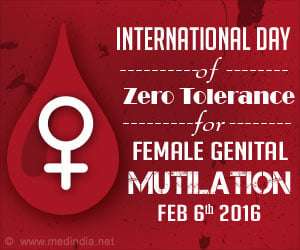Female Genital Mutilation stands as a primary factor behind mortality among girls and young women in nations where it is practiced.

Estimating excess mortality due to female genital mutilation
Go to source). In the nations where it is conducted, Female Genital Mutilation (FGM) emerges as a prominent factor contributing to mortality, resulting in the annual loss of over 44,000 additional lives among women and young girls.
Researchers Advocate Against Female Genital Mutilation (FGM)
Researchers are calling for FGM to be made illegal Mali, Malawi, Chad, Sierra Leone, and Liberia, given that legal change can lead to cultural change. They also say that efforts must be stepped up to eliminate FGM in countries where it is practiced.‘A 50% increase in the occurrence of girls undergoing female genital mutilation correlates with a rise in their five-year mortality rate, leading to an annual addition of 44,320 deaths in nations where the practice is common. #FGM’





Publishing their findings in Nature Scientific Reports, researchers from the Universities of Birmingham and Exeter analysed the numbers of girls subjected to FGM in Benin, Burkina Faso, Cameroon, Chad, Cote D’Ivoire, Egypt, Ethiopia, Guinea, Kenya, Mali, Niger, Nigeria, Senegal, Sierra Leone, and Tanzania. “There is cause for optimism, as work on non-communicable diseases shows effective interventions are possible, but change in patriarchal attitudes often lags other societal change – an important first step would be for FGM to be made illegal in the countries where it is within the law, given that legal change can lead to cultural change.”
Globally, over 200 million women and girls have been subjected to FGM – a practice which often happens in unsanitary conditions and without clinical supervision with consequent severe pain, bleeding, and infection. It is known to lead to obstetric complications, reductions in sexual function, and other long-term physical health problems, as well as mental health problems.
Economic Impact of FGM
The World Health Organisation (WHO) estimates the aggregate cost of medical treatment for girls and women after FGM was $1.4 billion in 2018. However, until now, there has been no systematic evidence about the role of FGM in the global epidemiology of child mortality – reflecting difficulties in measuring the practice.A key social dimension of FGM is how it impacts on marriage, for example, the practice influences women’s marriage opportunities in Western Africa - due to patriarchal culture and institutions.
“Our research suggests that decisions about FGM may reflect trade-offs between perceived disadvantages of FGM, such as pain and illegality, and expected benefits such reduced social sanctions and a higher bride-price – people may factor in an increased risk of death as part of that calculation,” added Professor Rockey.
Advertisement
- Estimating excess mortality due to female genital mutilation - (https://www.nature.com/articles/s41598-023-38276-6)









